democracynow.org
Stories:
 Weapons, Pipelines & Wall St: Did Clinton Foundation Donations Impact Clinton State Dept. Decisions?
Weapons, Pipelines & Wall St: Did Clinton Foundation Donations Impact Clinton State Dept. Decisions?
New questions have arisen this week over Hillary Clinton and the Clinton Foundation. On Tuesday, the Associated Press published a new investigation revealing that while Hillary Clinton served as secretary of state, more than half of the private citizens she met with had donated to the Clinton Foundation. The AP investigation comes after a three-year battle to gain access to State Department calendars. The analysis shows that at least 85 of 154 people Hillary Clinton had scheduled phone or in-person meetings with were foundation donors. This does not include meetings Clinton held with U.S. or foreign government workers or representatives, only private citizens. We speak to David Sirota of the International Business Times and Paul Glastris, editor-in-chief of the Washington Monthly. He was President Bill Clinton’s chief speechwriter from 1998 to 2001.
TRANSCRIPT
This is a rush transcript. Copy may not be in its final form.
AMY GOODMAN: New questions have arisen this week over Hillary Clinton and the Clinton Foundation. On Tuesday, the Associated Press published a new investigation revealing that while Hillary Clinton served as secretary of state, more than half the private citizens she met with had donated to the Clinton Foundation. The AP investigation comes after a three-year battle to gain access to State Department calendars. The analysis shows that at least 85 of 154 people Hillary Clinton had scheduled phone or in-person meetings with were foundation donors. This does not include meetings Clinton held with U.S. or foreign government workers or representatives, only private citizens. These 85 donors contributed more than $150 million to the foundation combined. Calling into CNN’s AC360 Wednesday, Clinton slammed the investigation.
HILLARY CLINTON: There’s a lot of smoke, and there’s no fire. This AP report, put it in context. It excludes nearly 2,000 meetings I had with world leaders, plus countless other meetings with U.S. government officials when I was secretary of state. It looked at a small portion of my time. And it drew the conclusion and made the suggestion that my meetings with people like the late great Elie Wiesel or Melinda Gates or the Nobel Prize winner Muhammad Yunus were somehow due to connections with the foundation instead of their status as highly respected global leaders. That is absurd. These are people I was proud to meet with, who any secretary of state would have been proud to meet with to hear about their work and their insight.
AMY GOODMAN: The AP says it’s been asking for the State Department schedules for three years and that what’s been released thus far covers only half of her four-year tenure.
Republican presidential nominee Donald Trump, who himself has donated $100,000 to the Clinton Foundation, has accused Clinton of selling access to the State Department.
DONALD TRUMP: We are going to end government corruption. Hillary Clinton ran the State Department like a failed leader in a Third World country. That’s what it’s run—it’s run like—like a Third World country. She sold favors and access in exchange for cash. She sold it.
AMY GOODMAN: Questions have also arisen over what will happen to the Clinton Foundation if Hillary Clinton wins the presidency. According to a new report in The Wall Street Journal, the Clinton Foundation will stop accepting corporate and foreign donations, but an exception may be made for the Clinton Health Access Initiative. The Journal also reports former President Bill Clinton will leave the board, but that Chelsea Clinton plans to stay on it.
Well, for more, we’re joined by two guests. David Sirota is the senior editor for investigations at the International Business Times. His most recent article is titled "Was There 'Pay to Play' at the Clinton Foundation?" We’re also joined by Paul Glastris, editor-in-chief of the Washington Monthly. He was President Bill Clinton’s chief speechwriter from 1998 to 2001.
We welcome you both to Democracy Now! Paul Glastris, let’s begin with you. What’s your reaction to these revelations of the Associated Press?
PAUL GLASTRIS: Well, you know, I read the story very carefully. I think Secretary Clinton kind of got it right. This was a eyebrow-raising piece of math that said half of the private-sector people she met with in her first two years were Clinton donors. Let’s—basically, there’s two—there’s two issues here. One, did she have special—did people who gave to the foundation have special access? And, two, did the access get them anything? Right? On the special access part, that piece of math that the AP story shows suggests that. That’s why people, I think, are paying attention. But it’s—actually, those 85 people are 1 percent of the Clinton Foundation donors. There are 7,000 Clinton Foundation donors; 85 got access.
And then you look at the individuals highlighted in the story. They’re people like Elie Wiesel, the Holocaust survivor and human rights activist. They’re people like Muhammad Yunus, who created the microfinance revolution that has lifted millions of the most destitute people out of poverty. They’re people who are running AIDS campaigns in Africa. So—and for the most part, these are people that have known Hillary Clinton for years, even decades. Muhammad Yunus and Hillary Clinton were doing microfinance in Arkansas in 1985. So, what these people seem to be, at least from the evidence of the story, are part of Hillary Clinton’s longtime network. And they also happen to be people who gave to her foundation. They don’t seem to be people who gave to her foundation in order to get to know Clinton. They’re people who gave to her foundation because they know Clinton. And that’s an important distinction.
AMY GOODMAN: David Sirota?
DAVID SIROTA: Well, my reaction to it is that I think that if you look at some of these individual examples, I think Paul is right that it’s hard to argue that their donations to the foundation got them access. They are—a lot of these people in the AP story are people who knew her.
But I think we should pull back and look at not just what the AP reported, but at the nexus between the donors to the Clinton Foundation—major corporate donors, major foreign government donors—and what business they had with the State Department. Look, the Clinton team, the foundation and the campaign, is saying that this is not going to happen if she is president. The question then becomes: Why was it then allowed to happen when she was secretary of state? The secretary of state has a huge amount of power over a huge number of issues and policies and contracts, for instance, that many of these donors had an interest in. And we did a series on, for instance, arms exports and how many of the governments that gave big to the Clinton Foundation saw huge increases in arms export authorizations from the State Department, and the State Department is the chief regulator of arms exports. There have been stories about foreign governments giving, like Algeria gave $500,000 to the Clinton Foundation at a time when it was lobbying the State Department on human rights issues. You had a situation, that The Wall Street Journal reported, where Hillary Clinton herself intervened in a case dealing with taxes with UBS, a Swiss bank, and then, suddenly, after that, UBS began donating big to the Clinton Foundation. So there are many examples of—I mean, there’s oil companies—that’s another one I should mention right now, which is that oil companies were giving big to the Clinton Foundation while lobbying the State Department—successfully—for the passage of the Alberta Clipper, the tar sands pipeline.
So, again, there are many of these examples where the people and corporations that were lobbying the State Department were giving huge to the Clinton Foundation. Do we know that that money made those deals and those—and access about those deals happen? I don’t think we know. But here’s the key point. The key point is that ethics rules have typically been in place in states and at the federal level that have said we want to prevent the appearance or the potential for conflicts of interest, because we understand that if the appearance or the potential for a conflict of interest is there, we can’t know if those conflicts are operationalized, that there are so many ways for them to be operationalized that we need to prevent the potential and appearance of a conflict of interest or potential appearance of a conflict of interest. And that is really what’s at issue here.
AMY GOODMAN: So, can you respond to that, Paul Glastris?
PAUL GLASTRIS: Well, that was a—that’s a whole lot of examples, and I can’t respond to, you know, each one individually. But I think we have now two big investigations—one by the AP, the other as a result of the conservative Judicial Watch lawsuit that showed various members of the—ex-members of the Clinton Foundation and others trying to get meetings with Secretary Clinton. And in virtually every case, the secretary’s people made the right choice. So, when an ex-Clinton Foundation official wanted a visa granted to a soccer player who had committed a felony, the answer became no. When the crown prince of Bahrain wanted a special meeting with Senator Clinton—Secretary Clinton, they said, you know, "Let’s have it go through official channels," and she got—he got the meeting, which is, of course, what he should have done. When Muhammad Yunus then asked for help because the government of Bangladesh was sort of destroying his leadership team at the bank that he created, and the entire international community said that that was wrong, she did act. So, in each of the situations where we have these internal records of what she did and who she met with, she did the right thing. And I don’t think there’s a lot of dispute about that. So, we don’t know what happened in these other instances, but we have had this kind of deep forensic now from some very, very—with some very, very good data, and it’s shown a very tight ship and a very ethical set of choices. So, you know, you can always raise these issues, but the facts we have from this reporting pretty strongly shows that there were not favors granted for any of this.
AMY GOODMAN: No favors—
DAVID SIROTA: But can I just—I mean, the—
AMY GOODMAN: David, go ahead.
DAVID SIROTA: The Bahrain example is a very good example. I mean, that is a very—I’m glad you brought it up. The Bahrain example, we saw that the email came in from the Clinton Foundation. The crown prince of Bahrain has given the Clinton Foundation $32 million. And I don’t think anybody is going to sit up and say the crown prince, one of the top leaders in a dictatorial regime, is giving money—we haven’t heard anyone argue that money from dictators typically comes because dictators want to reduce poverty in the world. So, money is coming into the Clinton Foundation from the crown prince of Bahrain. The Clinton Foundation reaches out to the State Department and says, "He is a good friend of ours," this person from this autocratic regime, head of the military there. The State Department says that the crown prince had already reached out to them and that Hillary Clinton wasn’t sure she wanted to have a meeting with him. And then, subsequently, the meeting happens.
And what happens after, if that—we don’t know if that meeting actually happened, but there was a—the State Department said it was going to happen. Subsequently, after that, what happened is that Bahrain saw a major increase in U.S. arms export authorizations from the Clinton State Department, at a time that Bahrain was facing the Arab Spring uprisings and was accused of human rights violations in crushing those protests. So, did the money and the Clinton Foundation relationship ultimately lead to those arms export deals? We don’t know. Did it potentially get access for that leader at that time? There’s certainly evidence that that could have happened.
And again, the question that this all revolves around is: Why was the potential for a conflict of interest allowed to exist at the State Department, when the Clinton campaign and the Clinton Foundation now says it’s now unacceptable if Hillary Clinton would be president? What is the difference there?
PAUL GLASTRIS: OK, well—well, can I address that particular point?
AMY GOODMAN: Go ahead, Paul Glastris.
PAUL GLASTRIS: So, the rules of Hillary Clinton and the existence of the foundation and what they could and couldn’t do were hashed out by the Obama White House and Hillary Clinton. So the rules she lived under were the Obama administration rules.
Moreover, the decision to sell arms to this or that country, though the State Department is the regulator, the ultimate regulator, these are made in interagency discussions pushed more by the Pentagon and the White House and other parts of the government than anywhere else. So, there’s no indication that Bahrain was—by putting money into the Clinton Foundation, it was influencing the Defense Department, that wanted to sell these weapons. So, you can question whether they should or shouldn’t have. They were right in the middle of orchestrating the Iran thing, and they had restive Sunni nations, so this was all—you know, if you like the Iran deal, you know, you have to balance that out. So—but this is—so, this is a function of what the Clinton Foundation and the Clinton Global Initiative is. And their basic business model is—
DAVID SIROTA: But here’s the question, Paul. I mean, the question becomes—
AMY GOODMAN: David Sirota.
DAVID SIROTA: Why were these leaders—let’s say, of these Middle Eastern dictatorships—why were they giving that money? I mean, these are sophisticated, politically sophisticated donors, them and corporations. They are repeatedly giving money to the Clinton Foundation. And I don’t think you’re arguing, and I haven’t heard anyone argue, that, you know, the Saudi regime or another dictatorial regime is giving money to the Clinton Foundation because they really—in the deep well of their heart, they want to solve poverty or help poor children. They are repeatedly giving money to the Clinton Foundation at a time they are seeking highly controversial—in this instance that we’re talking about, highly controversial arms deals. There was a Saudi deal where the State Department said it was Hillary Clinton’s personal top priority to get one of the biggest Saudi arms deals through. The Israelis were raising concerns about it.
PAUL GLASTRIS: Right.
DAVID SIROTA: It went through. And again, the money flowed into the Clinton—had flowed into the Clinton Foundation. So, why were those donors giving? What did they think they were getting?
PAUL GLASTRIS: OK—
DAVID SIROTA: And again, the critics of this say that what it ended up being was potentially a way that donors saw a way to curry favor with the State Department on controversial issues.
PAUL GLASTRIS: Right. OK, two points. One, the reason the Clinton State Department and the entire Obama administration was willing to give a lot of arms to the Saudis and the Bahrainis was that they were tubing the Saudis and the Bahrainis by trying to open negotiations with Iran. Everybody knows this. It’s not—we don’t need to kind of find some nefarious payoff in order to understand the policy. You can agree with the policy or disagree with the policy, but if you’re in favor of the opening of Iran, it’s hard to say they shouldn’t have sold these arms to the Sunnis. They were trying to keep a balance of power going in order to bring some kind of peace and resolution of these nuclear issues.
Now, on the Clinton Global Initiative, the point I was trying to make is, the whole business model of this thing is: Get rich people and governments to empty their wallets in order to help poor Africans who can’t afford AIDS drugs. Eleven million—that Bahraini money and that Saudi money was spent on things like training midwives in Ethiopia or lower-priced AIDS drugs for 11 million people. So, you know, that was the business model. You could say that’s a terrible business model, they shouldn’t have set it up. Fine, I understand, it looks bad. But that’s what the money went for. And, you know, it certainly leaves open questions as to whether that money bought influence. All I’m saying is, the deepest investigations we’ve had, this AP story and the Judicial Watch story, showed that that’s not the case.
AMY GOODMAN: David Sirota?
DAVID SIROTA: Well, I mean, look, again, I think you’re right to say that the Clinton Foundation has done projects and is involved in efforts that are laudable and philanthropic. But again, the deeper policy question here goes back to whether a potential conflict of interest, whether the appearance of a conflict of interest, should have been permissible at the State Department and what this money potentially bought.
And I want to go to the—one other point about the appearance of a conflict of interest, because I’ve heard a lot of pundits out there defending the Clintons with sort of the same talking points, saying, "Oh, well, there was a—there’s an appearance of a conflict of interest, and there was only a potential, and that’s all that can be proven." And, of course, if a lot of these same pundits, these Democratic pundits, were looking at a Republican situation, they would be screaming about how this is a huge scandal. But the key on the appearance of a conflict of interest is, if we want people to believe that their government is doing things in the right way in a democracy, that access isn’t being sold, that contracts aren’t being given out on the basis of preference and money going into a private foundation, appearances actually do matter. It is not something to throw—to pooh-pooh. Appearances really matter. The optics are not just some talking point. The optics matter in a democracy, when people—the public is asked to believe that its government is acting on behalf of the public interest. And in this case, all of these questions swirling around—the Clinton people seem to understand that those questions cannot exist when she was president, but why was it allowed to exist when she was in such a powerful position as America’s top diplomat?
AMY GOODMAN: We’re going to talk about—
DAVID SIROTA: That’s the central question.
AMY GOODMAN: We’re going to talk about what should happen with the Clinton Foundation, if Hillary Clinton became president. We’re speaking with David Sirota of the International Business Times, who has long covered the Clinton Foundation, and Paul Glastris, who was a President Bill Clinton speechwriter for a number of years and is now the editor of the Washington Monthly. Stay with us. ... Read More →
 "Our Revolution"? Bernie Sanders Launches New Organization, But Key Staffers Quit in Protest
"Our Revolution"? Bernie Sanders Launches New Organization, But Key Staffers Quit in Protest
Bernie Sanders and his supporters have launched a new political organization called Our Revolution. It seeks to support the next generation of progressive leaders, empower millions to fight for progressive change and elevate the nation’s overall political consciousness. More than 2,600 watch parties were held across the country last night to witness Sanders launch the new organization. But reports have emerged of political tumult within Bernie Sanders’s own team. Over the weekend, eight key staffers abruptly resigned in a dispute over the group’s leadership and legal structure. For more, we speak with Larry Cohen, incoming board chair of Our Revolution, and with Claire Sandberg, former digital organizing director for Bernie Sanders’s campaign, who resigned as the organizing director for Our Revolution.
TRANSCRIPT
This is a rush transcript. Copy may not be in its final form.
AMY GOODMAN: Senator Bernie Sanders and his supporters have launched a new political organization. It’s called Our Revolution. It seeks to support the next generation of progressive leaders, empower millions to fight for progressive change and elevate the nation’s overall political consciousness. More than 2,600 watch parties were held across the country Wednesday night to watch Sanders launch the new group.
SEN. BERNIE SANDERS: Tonight I want to introduce you to a new independent nonprofit organization called Our Revolution, which is inspired by the historic Bernie 2016 presidential campaign. Over time, Our Revolution will involve hundreds of thousands of people. These are people who will be fighting at the grassroots level for changes in their local school boards, in their city councils, in their state legislatures and in their representation in Washington. Not only that, they will be involved in major ballot items dealing with campaign finance issues, environmental issues, healthcare issues, labor issues, gender-related issues, and doing all that they can, in every way, to create an America based on the principles of economic, social, racial and environmental justice.
AMY GOODMAN: Former presidential candidate and Senator Bernie Sanders went on to reiterate his concerns about the Trans-Pacific Partnership, or TPP.
SEN. BERNIE SANDERS: I have worked with President Obama over the years on a number of issues, and he’s a friend of mine. But on the issue of the TPP, the Trans-Pacific Partnership, his support—very strong support—for that proposal is dead wrong. I intend—I intend to work with trade unions all over this country, environmental groups all over this country, religious groups all over this country, to do everything that I can, as Vermont senator, to defeat the TPP if it comes up in Congress in the lame-duck session. Now, the TPP, TPP, as is always the case, is supported by Wall Street. It is supported by corporate America. It is supported by all of the big money issues. But I believe that if we stand together, we can, in fact, defeat it.
AMY GOODMAN: That was Senator Sanders speaking last night at the launch of Our Revolution. He was in Burlington, Vermont. But reports have emerged of political tumult within Sanders’ own team. Over the weekend, eight key staffers abruptly resigned in a dispute over the group’s leadership and legal structure. That was more than half of the staff.
Well, for more, we’re joined by two guests in Washington, D.C. Larry Cohen is the incoming board chair of Our Revolution. He was a senior adviser to Bernie Sanders and past president of Communications Workers of America. He was also the first superdelegate for Bernie Sanders. And we’re joined by Claire Sandberg. She was the digital organizing director for Bernie Sanders’ campaign. On Sunday, she resigned as the organizing director for Our Revolution.
Larry Cohen and Claire Sandberg, welcome to Democracy Now! Larry, let’s begin with you. The significance of this new group that has been launched, with 2,600 parties around the country launching it last night?
LARRY COHEN: Yeah, amazing. I was at one of the events in Washington, D.C., in a small apartment, totally packed with more than 80 people, incredibly enthusiastic. But just as importantly, as you said, across the country, 2,600 events, another 200,000 people turned in—tuned in on their own to watch the live stream. The enthusiasm for this across the country is amazing. I was in Iowa this weekend with Iowa CCI, a big statewide community organization. The enthusiasm there, across Nebraska, where the new incoming head of the Democratic Party was actually at the same event with me last night, Jane Kleeb, who came in to lead the party on—from the victory in the Nebraska caucus. So, I think it’s, you know, literally from one end of the country to another, activists so enthused about what we can do together.
AMY GOODMAN: Claire Sandberg, you were a part of the Bernie Sanders campaign. You were the organizing director for Our Revolution. But right before it launched last night, you and more than half the staff quit. Why?
CLAIRE SANDBERG: Yes. Well, last Monday, as we were—as the staff at Our Revolution was—I’m sorry, there’s an echo. So, last Monday, as the staff of Our Revolution was preparing for a very busy week, gearing up for the launch event last night, we learned that Jeff Weaver would be stepping in to run, actively manage, Our Revolution, which was a decision that was met with unanimous concern among the entire staff at Our Revolution. And—
AMY GOODMAN: Now, Jeff Weaver was the campaign director of Bernie Sanders during his presidential campaign.
CLAIRE SANDBERG: Yes, Jeff was the campaign manager at the organization. And all of us who worked on the campaign who moved over to Our Revolution did so based on the promise that Jeff Weaver would not be involved in Our Revolution or that his role would be strictly constrained as a legal adviser or a board member who would have somewhat of a token role. But it became clear—and so, there were two main concerns among the staff. One, we all saw how Jeff ran the campaign, and there were a number of concerns about that. Secondly, Jeff’s leadership and advice as a legal adviser had already hamstrung Our Revolution before it even launched, specifically Jeff’s decision to constitute the organization as a 501(c)(4), which prevented us from doing effective down-ballot organizing for candidates, also effective down-ballot fundraising. And—
AMY GOODMAN: Why is that, Claire?
CLAIRE SANDBERG: Well, Jeff has gone on the record admitting that he wanted to form the organization as a 501(c)(4) for the express purpose of accepting billionaire money, which of course flies in the face of what all of our supporters were so excited about, that we were taking a country back from the billionaire class without the use of billionaire money, $27 at a time.
AMY GOODMAN: Larry Cohen, your response? You’re the incoming board chair of Our Revolution.
LARRY COHEN: Yeah, the board of Our Revolution will be key leaders from the various movements that make up progressive America, from civil rights, environmental justice, from people who are running for office. And there will be no contributions from billionaires, and I guarantee that. And I think it’s unfortunate that staff left. They’re good people. Jeff has worked with Bernie for 30 years. He’s very close to Bernie. But this—Our Revolution is not about Jeff or me or Claire; it’s about the hundreds of thousands of people that are networked across the country. My job as board chair—the board will be all volunteers—is to support those networks and those people, and to continue the political revolution that we saw in this campaign and that has its ancestry from the many movements in this country.
AMY GOODMAN: Claire Sandberg, the idea that it’s larger than any one person, and why you couldn’t be a part of it, moving into the future, given that you so clearly endorse the tenets of the organization, you know, its political philosophy?
CLAIRE SANDBERG: Yes, and it was an anguishing decision for all of us. And we thought about it for some time. The majority of the staff who resigned did not do so until almost a week later, on Sunday, when seven people resigned. We did that after thinking very hard about it, expressing our concerns repeatedly, saying we didn’t think we could work for Jeff. And I would say that the concerns were really twofold: one, that Jeff—under Jeff’s leadership, the organization would not be well run, given how we saw that he ran the campaign; and secondly, that Jeff wanted to take the organization down this path of accepting billionaire money, and specifically had chosen a legal structure for the organization that had already prevented us from doing effective organizing for candidates like Tim Canova, who has talked about how we have left him hanging, which is true. As the group was formed as a (c)(4), we legally couldn’t coordinate with Canova, couldn’t return his calls, couldn’t mobilize thousands of Bernie supporters locally in Miami or across the country to participate in his field operation, because we couldn’t talk to him. The same thing—
AMY GOODMAN: Explain what you mean by this.
CLAIRE SANDBERG: Well, a 501(c)(4) organization has a number of problems with it. One, federal officeholders cannot be involved in 501(c)(4) organizations. So, there is a real question about whether Bernie could even be involved as a spokesperson, as someone who could send out emails. Secondly, candidates cannot coordinate with 501(c)(4) organizations. We can’t—we can’t have private, nonpublic conversations about, for example, how to mobilize volunteers or what voters we’re talking to. We can’t make sure that we’re not duplicating efforts, calling the same voters twice. We can’t do any of those things.
AMY GOODMAN: Well, Larry Cohen, what about this?
LARRY COHEN: Well, you know, I’m not going to get into a legal wrangle with Claire. I think the key is that all of us on this board believe that we will mobilize millions of people. We’re not here to run campaigns. That would be a different kind of organization. We will mobilize millions of people against the TPP. We will enable people to donate to campaigns. We will be involved in eight ballot measures that are on the website right now, OurRevolution.com, that range from getting big money out of politics to single-payer healthcare in Colorado. We will be supporting, you know, great candidates, from Pramila Jayapal, who’s running for Congress in Seattle, to people running for school board. So, this is not—none of us on this board, and the design of this is not to run campaigns. The design of this is really to continue the political revolution.
AMY GOODMAN: On Wednesday evening, Senator Sanders stressed the importance of electing progressive candidates at the local level.
SEN. BERNIE SANDERS: As Americans, our goal must be to elect progressives at every level. And I want to mention just a few of the progressive candidates who Our Revolution will be supporting. And there will eventually be over 100 of them, in every region of our country, candidates from the school board to the United States Senate. Vernon Miller, a Native American, is running for the school board in Nebraska. And let me tell you, we need hundreds of candidates all over this country to run for school board. So I wish Vernon the best of luck. Jane Kim is a member of the San Francisco Board of Supervisors, and she is running for the state Senate in California. By the way, their state Senate districts are like the equivalent of the entire state of Vermont, so it’s not a small thing, you know. I campaigned with Kim when I was in San Francisco, and she will be a great addition to the California state Senate when she is elected.
AMY GOODMAN: That was Bernie Sanders last night in Burlington, Vermont. The Miami Herald has a headline, "Bernie Sanders is a No-Show for Tim Canova," in his South Florida battle against U.S. Representative Debbie Wasserman Schultz. Larry Cohen, do you know why?
LARRY COHEN: You know, I wouldn’t call him a no-show. I mean, Bernie is focused—he hasn’t—
AMY GOODMAN: He just didn’t mention him in this list of people he was talking about supporting, and he was so significant in going after Wasserman Schultz and supporting Canova before the Democratic convention.
LARRY COHEN: Yeah. Well, again, unless a mistake was made, I’m certain Tim Canova is on the initial list that was put up on the website last night. Huge amounts of money have been raised, you know, directly from donors, but through the emails from the Bernie Sanders campaign and from Our Revolution. Bernie has not campaigned since the convention in Philadelphia for anyone. He is actually writing a book. So I don’t think he’s running away from Tim Canova at all. I think the question is, you know, when does Bernie go back on the campaign trail? That is not what Our Revolution will manage. Again, what we will manage and support are these networks of people that are pushing to reform the Democratic Party, as I mentioned, at the state level, like a Jane Kleeb, at the local level, independents like two candidates running for the Richmond, California, City Council—in many cases, Democrats, in many cases, not. And so, I mean, that’s the story here.
AMY GOODMAN: And as we have 10 seconds, Claire Sandberg, what will you go on to do, given you’ve devoted your recent life to the Bernie Sanders campaign and now Our Revolution, before you quit?
CLAIRE SANDBERG: Myself and the other people who resigned will fight to continue the political revolution however we can, and do the work that we hope to do through this organization in some fashion.
AMY GOODMAN: I want to thank you both for being with us, Claire Sandberg, former organizing director for Our Revolution, and Larry Cohen, incoming board chair of Our Revolution. And, of course, we will continue to cover it.
This is Democracy Now! That does it for our broadcast. A very special belated happy birthday to Julie Crosby.
... Read More → Debate: Should the Clinton Foundation Be Shut Down If Hillary Clinton Wins?
Debate: Should the Clinton Foundation Be Shut Down If Hillary Clinton Wins?
According to a new report in The Wall Street Journal, if Hillary Clinton wins the presidency, the Clinton Foundation will stop accepting corporate and foreign donations—although an exception may be made for the Clinton Health Access Initiative. The Journal also reports that former President Bill Clinton will leave the board, but that Chelsea Clinton plans to stay on it. But some have called for the Clinton Foundation to be shut down entirely if Clinton wins. For more, we speak to David Sirota, the senior editor for investigations at the International Business Times. His most recent article is titled "Was There 'Pay to Play' at the Clinton Foundation?" We also speak with Paul Glastris, editor-in-chief of the Washington Monthly. He was President Bill Clinton’s chief speechwriter from 1998 to 2001.
TRANSCRIPT
This is a rush transcript. Copy may not be in its final form.
AMY GOODMAN: We continue our debate on Hillary Clinton and the Clinton Foundation. On Tuesday, the Associated Press published a new investigation revealing that while Clinton served as secretary of state, more than half the private citizens she met with had donated to the Clinton Foundation. Republican presidential nominee Donald Trump has accused her of selling access. Last night, Clinton called into CNN’s AC360 with Anderson Cooper.
HILLARY CLINTON: What Trump has said is ridiculous. My work as secretary of state was not influenced by any outside forces. I made policy decisions based on what I thought was right to keep Americans safe and to protect U.S. interests abroad. The foundation is a charity. Neither my husband nor I have ever drawn a salary from it. You know more about the foundation than you know about anything concerning Donald Trump’s wealth, his business, his tax returns.
AMY GOODMAN: Speaking in Ohio this week, Donald Trump urged the Justice Department to appoint a special prosecutor to investigate if donors to the Clinton Foundation got special treatment from the State Department.
DONALD TRUMP: The Clintons made the State Department into the same kind of pay-for-play operation as the Arkansas government was. Now, think of what happened back then. Think about it. And I love the state of Arkansas—we’re winning it big. But I’ll tell you, they know what went on. They know, and they’re not happy. Pay the Clinton Foundation huge sums of money and throw in some big speaking fees for Bill Clinton, and you got to play. You got to do what you wanted to do. It’s pretty sad. This is in front of the State Department. This is in front of the State Department. And long before that, you should have seen what they were doing in Arkansas. Same old story, folks. The amounts involved, the favors done and the significant number of times it was done require an expedited investigation by a special prosecutor immediately, immediately, immediately.
AMY GOODMAN: That’s Donald Trump, who himself gave $100,000 to the Clinton Foundation. We’re speaking to two guests: David Sirota, senior editor for investigations at the International Business Times, his most recent piece, "Was There 'Pay to Play' at the Clinton Foundation?" and Paul Glastris, editor-in-chief of the Washington Monthly, President Bill Clinton’s chief speechwriter from ’98 to 2001. A special prosecutor, Paul Glastris, what do you think about that?
PAUL GLASTRIS: Not going to happen. You know, a silly Donald Trumpism. Look, the point I was making before the break is—and I agree with David Sirota—the appearances raise questions. The appearances of these donors, who also have business in front of the State Department, raise questions. We’ve just—speaking of special prosecutor, we’ve just had two deep investigations, sort of like random audits, of whether any of this is true. We have now scores of examples of attempts to gain access, attempts to get favors. In every case that we have on the record, through these investigations, we see that Hillary Clinton and her staff did the right thing.
Does that mean in every case they did the right thing? No. But we know more about Hillary’s State Department and the inner workings of the decisions than we have on almost any Cabinet secretary that one can think of. You know, in the Bush administration, George W. Bush’s administration, his father had the Points of Light foundation. People were giving money to the Points of Light foundation, a charity, not unlike the Clinton Foundation, and we don’t know anything about who gave, what favors were asked for, what access there was, partly because the Bush administration expunged, accidentally, all of its emails, but partly because nobody ever asked those questions.
AMY GOODMAN: Well, let me—let me put—let David Sirota respond. And as we wrap up, what should happen to the Clinton Foundation if Hillary Clinton were to become president, David Sirota?
DAVID SIROTA: Well, a special prosecutor, I agree, I don’t think it’s going to happen. I mean, the Obama administration has barely—hasn’t prosecuted Wall Street after the financial crisis. The FBI said—had raised questions about what it found with the Clinton Foundation, didn’t move forward. So, I think, politically, the idea of the Obama administration investigating Hillary Clinton and Bill Clinton is just not going to happen.
But there are still a lot of issues swirling around. I mean, the other issue, outside the foundation, is, you know, Bill Clinton was paid millions of dollars from companies, personally, for speaking engagements, at the very same time these companies were lobbying the State Department. A special prosecutor is the only real way to get subpoena power to uncover and find out what really fully happened. And Paul mentioned that there were investigations, but that didn’t have subpoena power, and you’re sort of at the mercy of Freedom of Information Act requests that the Obama administration itself has power over.
AMY GOODMAN: And Paul’s point that George—
DAVID SIROTA: Will a special prosecutor happen? We don’t know.
AMY GOODMAN: And Paul’s point that George H.W. Bush also had a foundation when his son was president?
DAVID SIROTA: Look, certainly, this is an issue that has existed for a long time. And I think a lot of people in the public are saying at least it’s a good thing that there’s more scrutiny happening on this set of issues, presidential foundations and the like. And it’s going to be interesting to see what happens moving forward.
You asked what’s going to happen to the Clinton Foundation. I’m a journalist. I don’t think—I don’t kind of offer up what I think should happen. I think there are folks out there, critics on the Republicans, maybe purely opportunistic partisans, if you will, saying that it should be shut down. There is going to be—the Clintons have agreed to this—an effort to effectively unwind the foundation to try to preserve what it does that’s good, but unwind and extricate their relationships from it. I think that’s likely to happen in some way, although The Washington Post, I believe, reported that the policy they’ve put out, the promises they’ve made, will not fully end all the kinds of donations that are at issue here that we’re discussing today.
AMY GOODMAN: And, Paul Glastris, do you think it should shut down or President Clinton should step down from the board, the discussion now that Chelsea Clinton would remain on the board?
PAUL GLASTRIS: Well, you know, I’m a little melancholy about the whole thing, because this is, you know, a spectacularly successful organization at helping millions and millions of deserving poor people around the world. And you extricate the Clintons from that, you extricate the political juice and energy and vision behind that, so it won’t be the same organization that it was before. And I think that’s why the Obama administration thought, you now, it was OK and the right choice to keep it going, to allow what happened to happen. But given all these questions, I suppose it’s really the only sensible thing. And I don’t know if, you know, it makes sense for Chelsea to run it or not. I haven’t really thought that through. So, if she’s going to be president of the United States, yes, I think it probably should be wound down, as David said, and some—you know, the best parts kept going. I’m just a little sad about it, because it’s done a tremendous amount of good.
AMY GOODMAN: Well, we’re going to leave it there but continue to follow this issue. I want to thank Paul Glastris, editor-in-chief of the Washington Monthly, former President Bill Clinton speechwriter. And David Sirota, we will link to your pieces at the International Business Times.
This is Democracy Now! When we come back, Bernie Sanders has launched a new organization. There were 2,600 parties last night to hear him speak. We’ll have a debate. Stay with us.... Read More →
Headlines:Italy: Death Toll from Earthquake Rises to 247
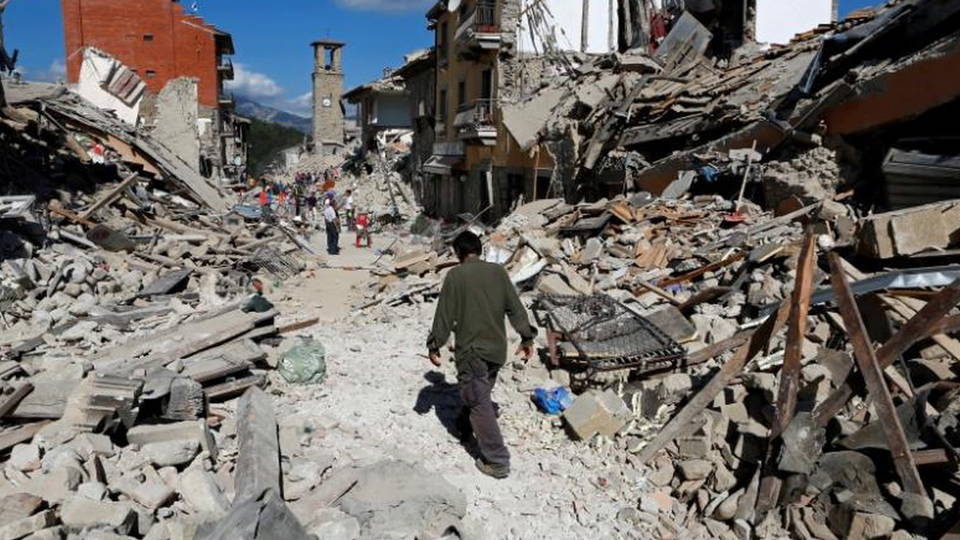 In Italy, the death toll continues to rise from a devastating 6.2-magnitude earthquake. At least 247 people are confirmed dead. Dozens more people are still missing, as search and rescue teams are using everything from bulldozers to bare hands to scour the rubble for bodies and survivors. The earthquake struck central Italy early Wednesday morning. Homes, churches, stores and even a hotel collapsed as people were sleeping. This is a local resident speaking Wednesday about the earthquake.
In Italy, the death toll continues to rise from a devastating 6.2-magnitude earthquake. At least 247 people are confirmed dead. Dozens more people are still missing, as search and rescue teams are using everything from bulldozers to bare hands to scour the rubble for bodies and survivors. The earthquake struck central Italy early Wednesday morning. Homes, churches, stores and even a hotel collapsed as people were sleeping. This is a local resident speaking Wednesday about the earthquake.Alessandro Gabrielli: "Tonight will be our first nightmare night, because last night I woke up with a sound that sounded like a bomb. It was deafening. And then it was also disheartening, because everything was collapsing on me. Tonight, we think we’ll sleep together with our relatives and friends in the tents that they are providing us."
This comes as a 6.8-magnitude earthquake also struck Burma on Wednesday, killing three people.
Afghanistan: 13 Killed in Attack on American University in Kabul
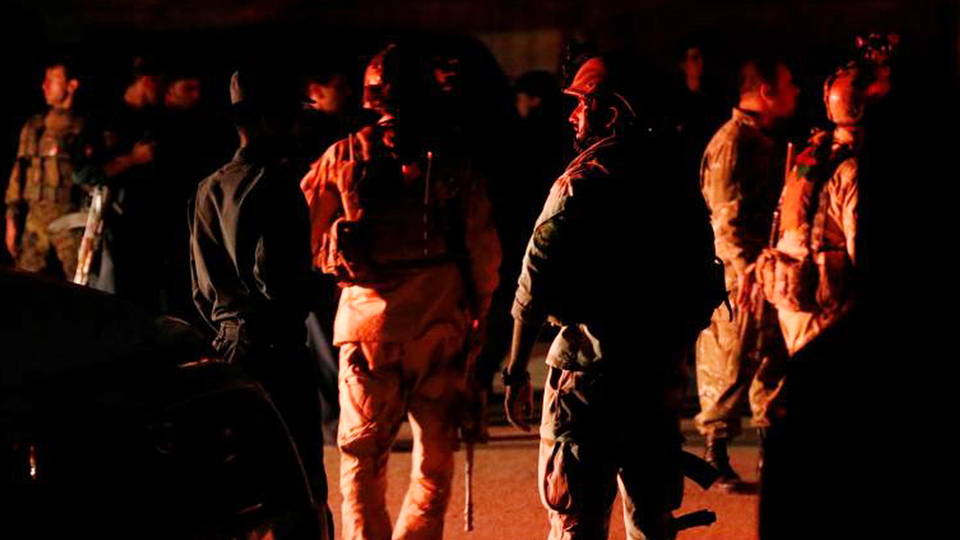 In Afghanistan, at least 13 people have been killed in an attack on the American University in Kabul. Seven of the victims were students. The attack began with a car bomb explosion. Gunmen then forced their way into the university and opened fire. So far, no one has claimed responsibility for the attack. Two weeks ago, American University of Afghanistan temporarily suspended campus operations after two teachers, an Australian and an American, were kidnapped at gunpoint.
In Afghanistan, at least 13 people have been killed in an attack on the American University in Kabul. Seven of the victims were students. The attack began with a car bomb explosion. Gunmen then forced their way into the university and opened fire. So far, no one has claimed responsibility for the attack. Two weeks ago, American University of Afghanistan temporarily suspended campus operations after two teachers, an Australian and an American, were kidnapped at gunpoint.Colombian Government & FARC Rebels Sign Peace Accords
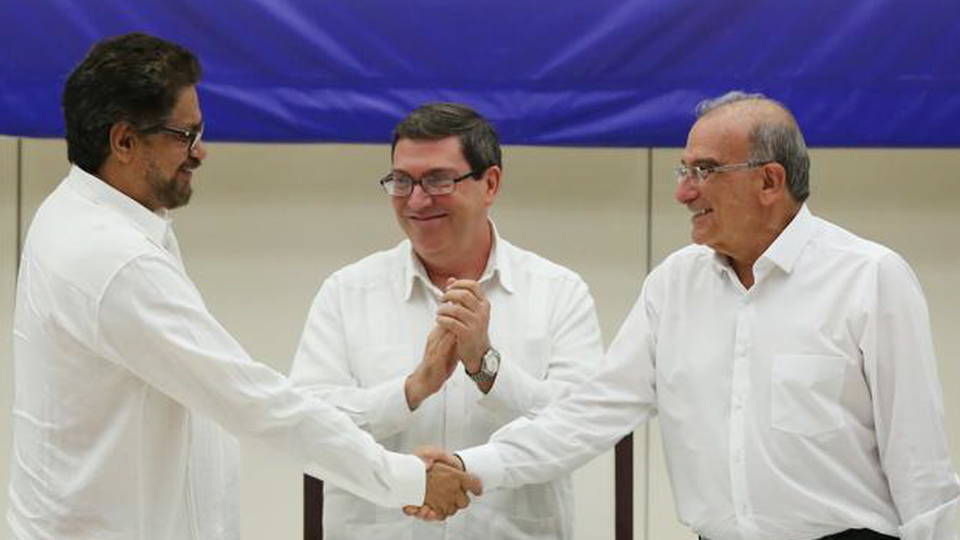 In news on Colombia, government officials and FARC rebels signed a historic peace accord during a ceremony in Havana, Cuba, on Wednesday. The signing is the latest step in the efforts to end one of the world’s longest conflicts. It began in 1964 and has claimed some 220,000 lives. More than 5 million people are estimated to have been displaced. Speaking in Havana on Wednesday, FARC peace negotiator Iván Márquez celebrated the historic agreement.
In news on Colombia, government officials and FARC rebels signed a historic peace accord during a ceremony in Havana, Cuba, on Wednesday. The signing is the latest step in the efforts to end one of the world’s longest conflicts. It began in 1964 and has claimed some 220,000 lives. More than 5 million people are estimated to have been displaced. Speaking in Havana on Wednesday, FARC peace negotiator Iván Márquez celebrated the historic agreement.Iván Márquez: "I believe we have won the most beautiful of all battles: the battle for peace in Colombia. Today, we closed in Havana, Cuba, the peace process Colombia has most yearned for—land, democracy, victims, policies, weapons, the implementation of the accords as international eyes look on. Among others, these are the elements of an agreement that will need to be converted—sooner rather than later—by a referendum in a norm to guarantee a future with dignity for all."
Clinton Slams AP Article About Her Meeting with Foundation Donors
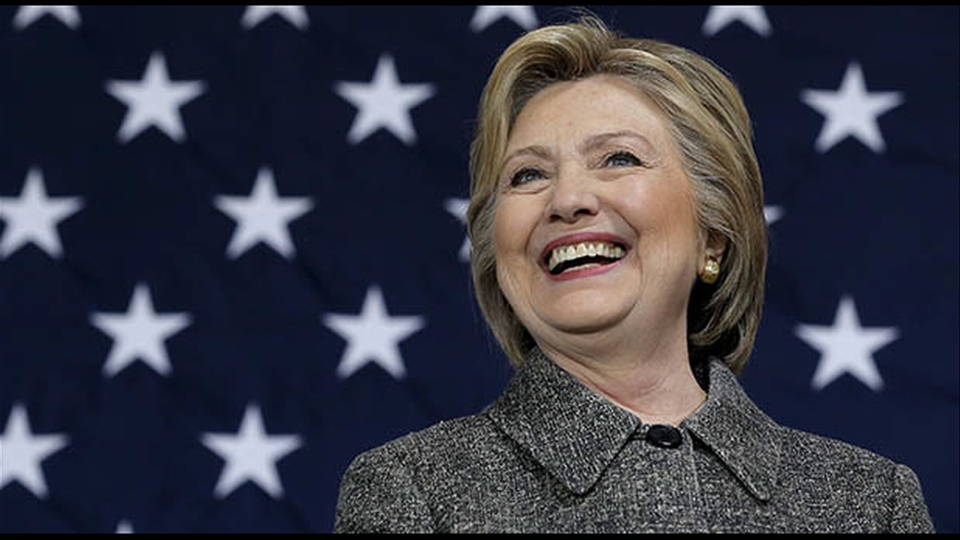 In news from the campaign trail, Hillary Clinton has slammed a new Associated Press investigation into her meetings with Clinton Foundation donors while she served as secretary of state. The investigation revealed that more than half of the private citizens she met with had donated to the Clinton Foundation. This does not include her meetings with U.S. or foreign government workers or representatives. In response, Clinton has called the investigation "absurd" and said, "There’s a lot of smoke, and there’s no fire." She’s also said the investigation is incomplete. But the AP says it has been asking for the schedules for three years and that what has been released thus far covers only half of her four-year tenure. We’ll host a debate about the Clinton Foundation after headlines.
In news from the campaign trail, Hillary Clinton has slammed a new Associated Press investigation into her meetings with Clinton Foundation donors while she served as secretary of state. The investigation revealed that more than half of the private citizens she met with had donated to the Clinton Foundation. This does not include her meetings with U.S. or foreign government workers or representatives. In response, Clinton has called the investigation "absurd" and said, "There’s a lot of smoke, and there’s no fire." She’s also said the investigation is incomplete. But the AP says it has been asking for the schedules for three years and that what has been released thus far covers only half of her four-year tenure. We’ll host a debate about the Clinton Foundation after headlines.British Brexit Leader Campaigns with Trump in Mississippi
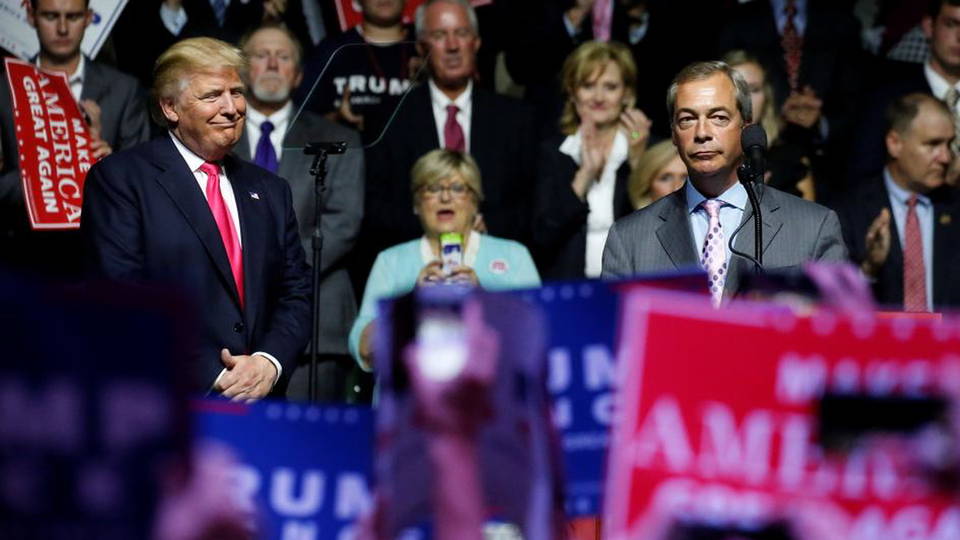 British politician Nigel Farage joined Donald Trump at a campaign rally in Mississippi Wednesday. Farage was one of the leaders of Britain’s campaign to leave the European Union, known as "Brexit." Trump has praised Brexit, saying the British people had "taken back their country." Farage did not endorse Trump on Wednesday, but he did slam Hillary Clinton.
British politician Nigel Farage joined Donald Trump at a campaign rally in Mississippi Wednesday. Farage was one of the leaders of Britain’s campaign to leave the European Union, known as "Brexit." Trump has praised Brexit, saying the British people had "taken back their country." Farage did not endorse Trump on Wednesday, but he did slam Hillary Clinton.Nigel Farage: "If I was an American citizen, I wouldn’t vote for Hillary Clinton if you paid me. ... You can go out. You can beat the pollsters. You can beat the commentators. You can beat Washington. And you’ll do it by doing what we did for Brexit in Britain."
Trump Appears to Question His Mass Deportation Plan
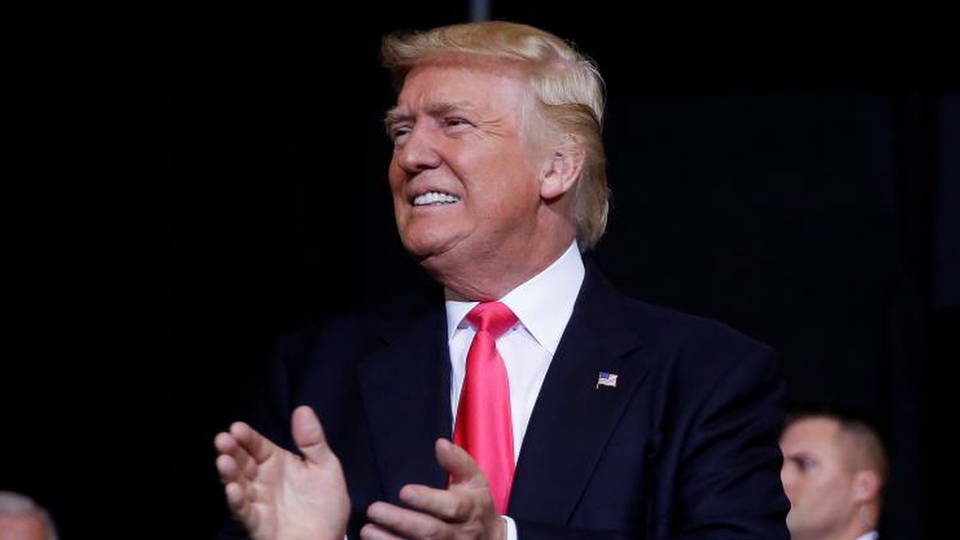 Donald Trump appeared to flip-flop on his immigration proposals during a town hall hosted by Fox News’ Sean Hannity that was broadcast Wednesday night. Donald Trump has made the mass deportation of 11 million undocumented immigrants one of the cornerstone proposals of his campaign. But at the town hall, Trump appeared to go back and forth, at times saying that he’d be willing to "work with" some undocumented people if they pay back taxes. Many commentators have pointed out this proposal is very similar to the plans put forward by Jeb Bush and his other opponents, whom Trump derided earlier in the campaign as being too soft on immigration. Many have also pointed out that undocumented immigrants already do pay taxes and are already required to pay any owed back taxes as part of immigration processes required to legally stay in the country. Sean Hannity has acknowledged advising the Trump campaign, saying, "I never claimed to be a journalist."
Donald Trump appeared to flip-flop on his immigration proposals during a town hall hosted by Fox News’ Sean Hannity that was broadcast Wednesday night. Donald Trump has made the mass deportation of 11 million undocumented immigrants one of the cornerstone proposals of his campaign. But at the town hall, Trump appeared to go back and forth, at times saying that he’d be willing to "work with" some undocumented people if they pay back taxes. Many commentators have pointed out this proposal is very similar to the plans put forward by Jeb Bush and his other opponents, whom Trump derided earlier in the campaign as being too soft on immigration. Many have also pointed out that undocumented immigrants already do pay taxes and are already required to pay any owed back taxes as part of immigration processes required to legally stay in the country. Sean Hannity has acknowledged advising the Trump campaign, saying, "I never claimed to be a journalist."Biden Visits Ankara Amid U.S.-Backed Turkish Offensive into Syria
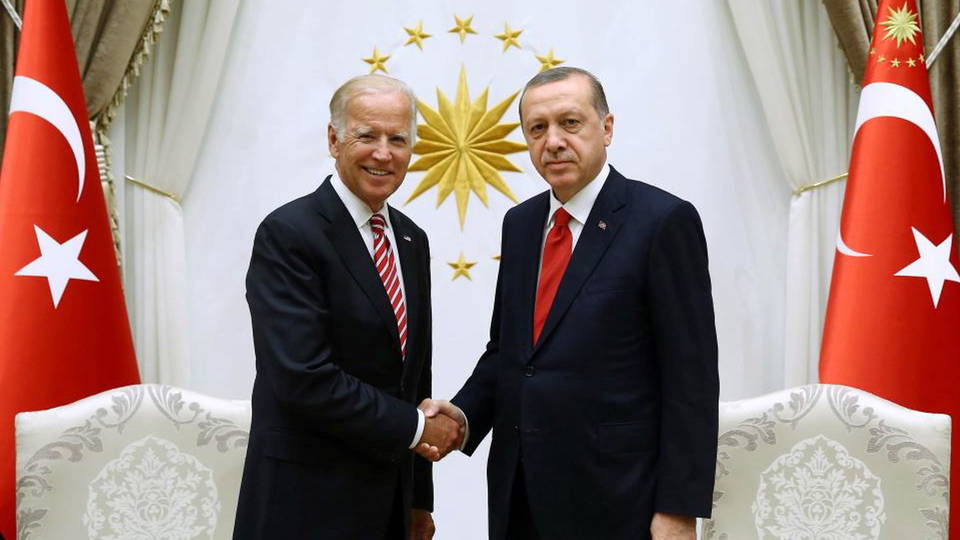 The Turkish military deployed tanks and special operations troops into northern Syria Wednesday, backed by the U.S. Air Force. The offensive helped the Free Syrian Army take the town of Jarabulus from ISIS control. The operation was a major escalation of Turkey’s role in the ongoing Syrian war, and it came as Vice President Joe Biden visited Ankara Wednesday. The Pentagon says the U.S. launched airstrikes and helped advise the operation.
The Turkish military deployed tanks and special operations troops into northern Syria Wednesday, backed by the U.S. Air Force. The offensive helped the Free Syrian Army take the town of Jarabulus from ISIS control. The operation was a major escalation of Turkey’s role in the ongoing Syrian war, and it came as Vice President Joe Biden visited Ankara Wednesday. The Pentagon says the U.S. launched airstrikes and helped advise the operation.Report: Assad & ISIS Have Carried Out Chemical Weapons Attacks
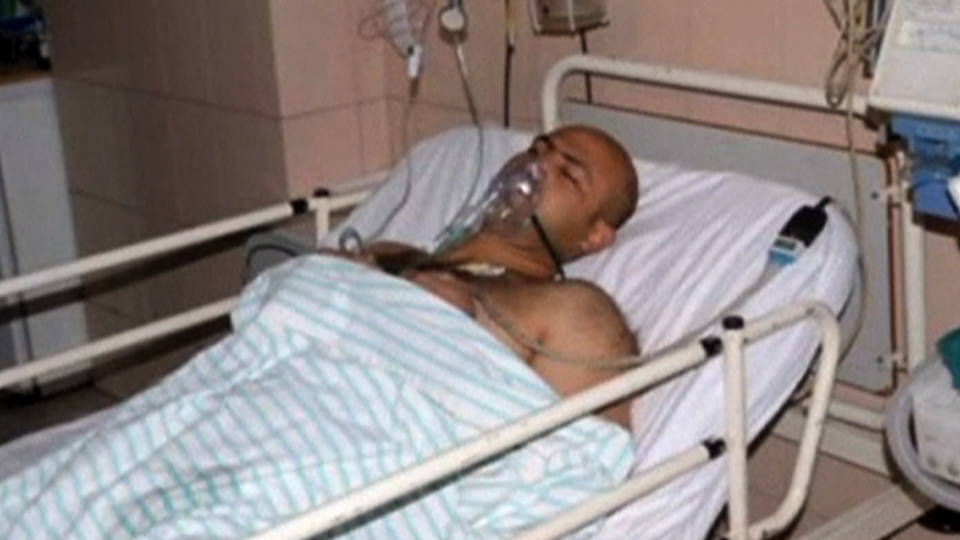 Meanwhile, a United Nations team has concluded the Assad government and ISISmilitants have carried out repeated chemical weapons attacks in Syria in 2014 and 2015. The report accuses Assad of twice using chlorine gas. It also accuses ISIS of using mustard gas.
Meanwhile, a United Nations team has concluded the Assad government and ISISmilitants have carried out repeated chemical weapons attacks in Syria in 2014 and 2015. The report accuses Assad of twice using chlorine gas. It also accuses ISIS of using mustard gas.Report: Baltimore Police Are Secretly Surveilling City from Above
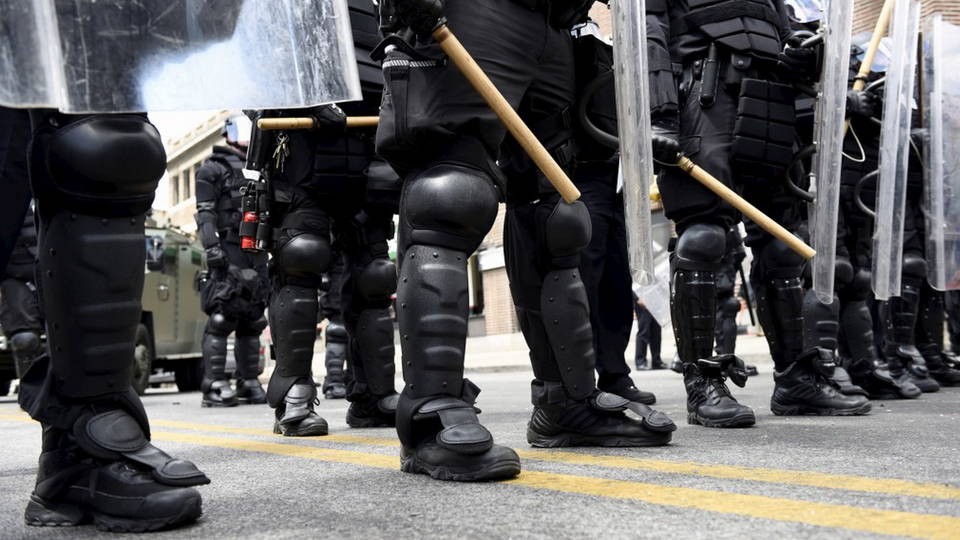 A new investigation by Bloomberg Businessweek has revealed police in Baltimore have been secretly testing an aerial surveillance system that records the movements and actions of Baltimore residents in real time from a low-flying plane. The technology has been adapted from the U.S. military’s surveillance programs aimed at detecting roadside bombs in Iraq. The plane is equipped with multiple cameras that can record 30-square-mile swaths of the city at a time. The plane is the creation of the private company Persistent Surveillance Systems. The project is bankrolled by John Arnold, a former Enron trader and hedge funder. The plane has been circling above Baltimore since January, without the public ever being notified.
A new investigation by Bloomberg Businessweek has revealed police in Baltimore have been secretly testing an aerial surveillance system that records the movements and actions of Baltimore residents in real time from a low-flying plane. The technology has been adapted from the U.S. military’s surveillance programs aimed at detecting roadside bombs in Iraq. The plane is equipped with multiple cameras that can record 30-square-mile swaths of the city at a time. The plane is the creation of the private company Persistent Surveillance Systems. The project is bankrolled by John Arnold, a former Enron trader and hedge funder. The plane has been circling above Baltimore since January, without the public ever being notified.Report: NYPD Broke Rules in Muslim Spying After 9/11
 Meanwhile, in New York, a new report says the New York Police Department Intelligence Bureau frequently broke rules while surveilling Muslim American residents after the September 11, 2001, attacks. The report was issued by the Office of the Inspector General for the New York Police Department Tuesday. It says the agency failed to offer information about the role of undercover cops and informants in intelligence gathering and let deadlines pass during investigations. The Inspector General’s Office says the violations demonstrate the need for continued oversight of the NYPD.
Meanwhile, in New York, a new report says the New York Police Department Intelligence Bureau frequently broke rules while surveilling Muslim American residents after the September 11, 2001, attacks. The report was issued by the Office of the Inspector General for the New York Police Department Tuesday. It says the agency failed to offer information about the role of undercover cops and informants in intelligence gathering and let deadlines pass during investigations. The Inspector General’s Office says the violations demonstrate the need for continued oversight of the NYPD.Kashmir: Indian Troops Open Fire on Protesters, Killing 1
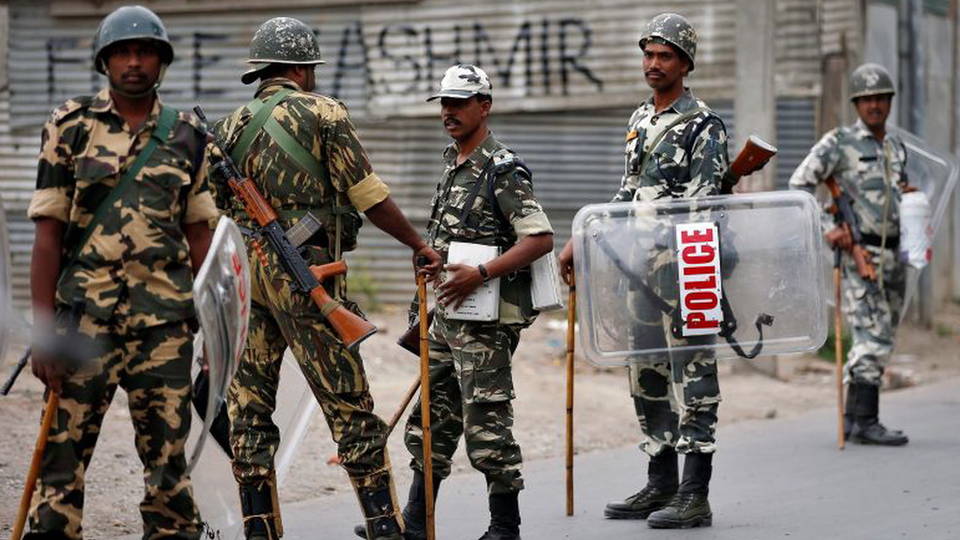 In Kashmir, another protester has been killed and as many as 50 people wounded when Indian security forces opened fire and threw tear gas at crowds of protesters. Residents say the confrontation came after Indian troops descended on a neighborhood, beating people and destroying a tent that was to host a meeting about Kashmir’s independence. It’s at least the 70th confirmed death in Kashmir since anti-India protests erupted on July 8, after Indian security forces killed a prominent Kashmiri independence leader. On Wednesday, the Indian home minister traveled to Kashmir for a two-day visit aimed at defusing the protests.
In Kashmir, another protester has been killed and as many as 50 people wounded when Indian security forces opened fire and threw tear gas at crowds of protesters. Residents say the confrontation came after Indian troops descended on a neighborhood, beating people and destroying a tent that was to host a meeting about Kashmir’s independence. It’s at least the 70th confirmed death in Kashmir since anti-India protests erupted on July 8, after Indian security forces killed a prominent Kashmiri independence leader. On Wednesday, the Indian home minister traveled to Kashmir for a two-day visit aimed at defusing the protests.Ethiopian Silver Medalist Who Staged Olympic Protest Fears Returning Home
 Ethiopian Olympic runner Feyisa Lelisa is expressing concern about going home, after he raised his arms in an "X" as he won a silver medal in the marathon to protest Ethiopia’s human rights abuses against his ethnic tribe, the Oromo people. For over two years, the Oromo have staged massive nationwide protests against the Ethiopian government. The protests were initially sparked by the government’s plan to lease a forest to private developers. Ethiopian forces have responded with a brutal crackdown against the Oromo protesters, killing hundreds of people. This is Feyisa Lelisa’s wife, speaking about her husband’s Olympic protest.
Ethiopian Olympic runner Feyisa Lelisa is expressing concern about going home, after he raised his arms in an "X" as he won a silver medal in the marathon to protest Ethiopia’s human rights abuses against his ethnic tribe, the Oromo people. For over two years, the Oromo have staged massive nationwide protests against the Ethiopian government. The protests were initially sparked by the government’s plan to lease a forest to private developers. Ethiopian forces have responded with a brutal crackdown against the Oromo protesters, killing hundreds of people. This is Feyisa Lelisa’s wife, speaking about her husband’s Olympic protest.Iftu Mulisa: "I was very scared at the time, but I wasn’t surprised, because I know him. He was burning inside when he sees on social media all these dead bodies, people being beaten and people being arrested. So I was not surprised, because I know he has a lot of anger inside."
With Baton Rouge Still Underwater, Gov't Auctions Off Gulf Oil Leases
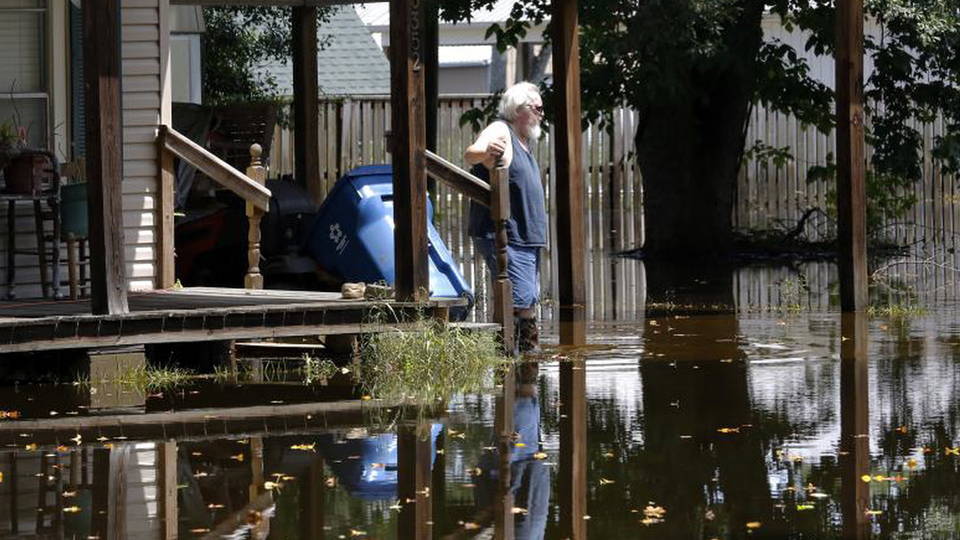 In Louisiana, the Interior Department’s massive lease sale for oil and gas drilling in the Gulf of Mexico attracted a record low number of bids on Wednesday. Only three companies expressed any interest, bidding on only 24 of the more than 4,000 tracts. Industry experts blamed low oil prices for the low number of bids. On Tuesday, four environmental activists were arrested protesting the lease sale—which came only one day after President Obama toured flood-damaged neighborhoods in Baton Rouge. Some areas are still submerged in feet of standing water, two weeks after the floods. The rainfall in Baton Rouge is the worst it’s been in recorded history, in close to 175 years.
In Louisiana, the Interior Department’s massive lease sale for oil and gas drilling in the Gulf of Mexico attracted a record low number of bids on Wednesday. Only three companies expressed any interest, bidding on only 24 of the more than 4,000 tracts. Industry experts blamed low oil prices for the low number of bids. On Tuesday, four environmental activists were arrested protesting the lease sale—which came only one day after President Obama toured flood-damaged neighborhoods in Baton Rouge. Some areas are still submerged in feet of standing water, two weeks after the floods. The rainfall in Baton Rouge is the worst it’s been in recorded history, in close to 175 years.Hundreds Rally in D.C. as Judge Delays Ruling in Dakota Access Suit
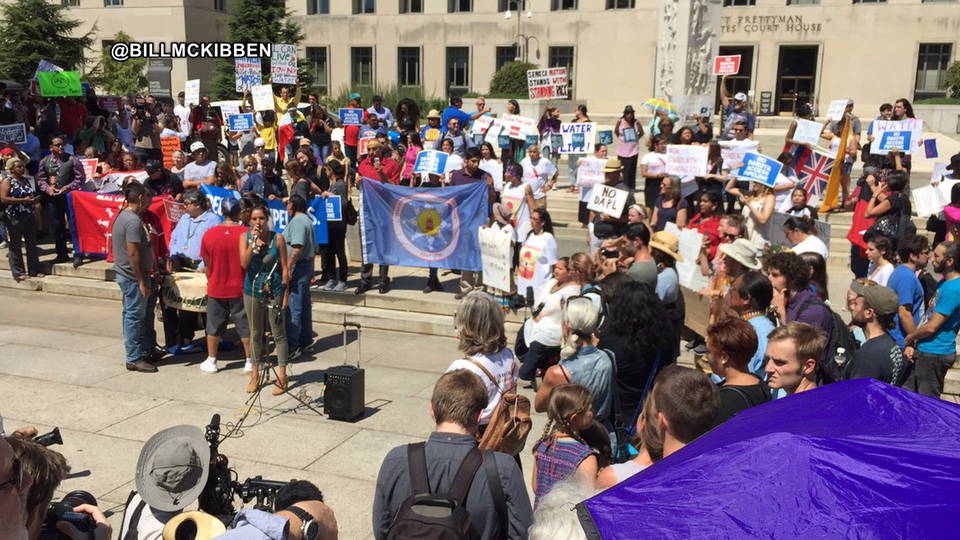 In Washington, D.C., hundreds of people rallied in opposition to the $3.8 billion Dakota Access pipeline, as a judge delayed his ruling in a federal lawsuit against the Army Corps of Engineers over the pipeline’s approval. The Standing Rock Sioux Tribe, which filed the lawsuit, says it was not sufficiently consulted before the Army Corps of Engineers approved the 1,168-mile pipeline. The district court judge said he’d announce a decision in the suit by September 9. In North Dakota, thousands of indigenous people from dozens of tribes have gathered at the Sacred Stone Spirit Camp to block the pipeline’s construction. On Wednesday, camp leaders announced they’d continue the camp until the next trial date. This is Vic Camp.
In Washington, D.C., hundreds of people rallied in opposition to the $3.8 billion Dakota Access pipeline, as a judge delayed his ruling in a federal lawsuit against the Army Corps of Engineers over the pipeline’s approval. The Standing Rock Sioux Tribe, which filed the lawsuit, says it was not sufficiently consulted before the Army Corps of Engineers approved the 1,168-mile pipeline. The district court judge said he’d announce a decision in the suit by September 9. In North Dakota, thousands of indigenous people from dozens of tribes have gathered at the Sacred Stone Spirit Camp to block the pipeline’s construction. On Wednesday, camp leaders announced they’d continue the camp until the next trial date. This is Vic Camp.Vic Camp: "We need each other. We have to stand together in unity to protect sacred water and Mother Earth. We stand with our chanunpa. We stand with our wives and our children and our grandparents. We stand with Ozuye to protect Mother Earth."
Amnesty International says it is sending a delegation to Sacred Stone Spirit Camp to monitor the police and law enforcement response to the ongoing protests.
Scientists Discover New Planet That Could Be Home to Life
 Scientists have discovered a new planet they say could have Earth-like conditions and maybe even liquid water on its surface. The planet has been named Proxima b. Scientists say the planet may be home to life.
Scientists have discovered a new planet they say could have Earth-like conditions and maybe even liquid water on its surface. The planet has been named Proxima b. Scientists say the planet may be home to life."Cocks Not Glocks": Students at UT Austin Protest Campus Carry Law
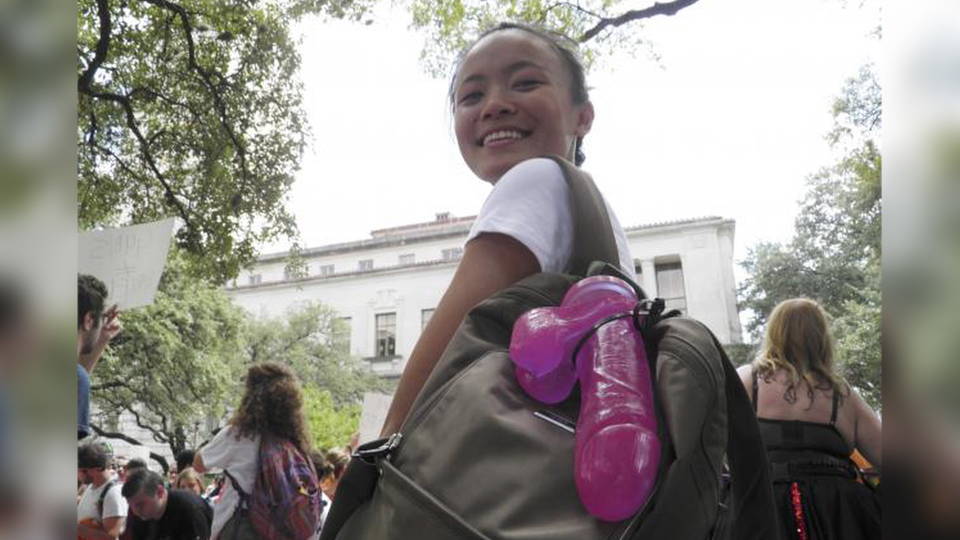 And hundreds of students at the University of Texas at Austin rallied and carried thousands of dildos to their first day of classes to protest Texas’s new open-carry law, which allows license holders to legally carry guns on campus and inside university buildings. The new open-carry laws went into effect on August 1—the same day Texas marked the 50th anniversary of a mass shooting at the University of Texas at Austin, when an engineering student and Marine veteran opened fire from atop the university clock tower, killing 14 people on campus, after having killed his wife and his mother.
And hundreds of students at the University of Texas at Austin rallied and carried thousands of dildos to their first day of classes to protest Texas’s new open-carry law, which allows license holders to legally carry guns on campus and inside university buildings. The new open-carry laws went into effect on August 1—the same day Texas marked the 50th anniversary of a mass shooting at the University of Texas at Austin, when an engineering student and Marine veteran opened fire from atop the university clock tower, killing 14 people on campus, after having killed his wife and his mother.Donate today:
Follow:




WEB EXCLUSIVE
Climate Change and the 1,000-year Flood in Baton Rouge: When Will We Learn? by Amy Goodman and Denis Moynihan
The floodwaters are receding in Baton Rouge, Louisiana, and the scale of the damage is revealing itself. It has been described as a 1,000-year flood, leaving at least 13 people dead and close to 60,000 homes ruined. According to Weather Underground meteorologists Jeff Masters and Bob Henson, August has been the wettest month in Baton Rouge in 174 years, when records were first kept. They added, “Since June 1, Baton Rouge has picked up an amazing 40.95 inches—more rain in three months than downtown Los Angeles has recorded over the last five years (38.79 inches)!”
President Barack Obama traveled there Tuesday. “I think anybody who can see just the streets, much less the inside of the homes here, people’s lives have been upended by this flood,” he said after walking through part of the devastated city. While Obama was criticized by his political opponents for not visiting Baton Rouge earlier, it’s what happened one day later, in nearby New Orleans, that should have everyone concerned.
The Obama administration conducted a massive auction of offshore oil and gas drilling leases in the Gulf of Mexico. The irony was not lost on Antonia Juhasz. She is a journalist and energy analyst who has long tracked the multinational petroleum corporations engaged in deep-water oil extraction. “Following Obama #LouisianaFlood visit, Interior Dept to auction offshore drilling leases to 24 million acres in Gulf on 8/24 at Superdome,” she tweeted, followed by, “After protests nearly shut down lease sale in March at Superdome, for first time, BOEM closes sale to public, makes viewing available online.” The BOEM is the federal Bureau of Ocean Energy Management. The agency was auctioning 23.8 million acres in the western section of the Gulf of Mexico, for deep-water oil and gas exploration and extraction.
We spoke to Juhasz on the “Democracy Now!” news hour, just before the auction began: “The timing of all of these events couldn’t be more devastating,” she said. “You have this historic flood. You have the president there to offer assistance from FEMA and to hopefully try and assist those on the ground, while at the same time the Interior Department is continuing the problems that help accelerate this storm in the first place, help make it more ferocious, help make these storms more frequent. And that, of course, is the burning of fossil fuels, leading to climate change.” Adding to the irony is the site of the auction: the Superdome. After Hurricane Katrina inundated most of New Orleans, this sports stadium became a refuge of last resort for an estimated 15,000-20,000 stranded residents.
While any one extreme weather event can’t be directly attributed to climate change, storms, droughts, wildfires, floods and hurricanes all are expected to become more frequent and more severe as the planet warms. Those thousands in the Superdome after Katrina should be considered climate refugees. For this building now to house the auctions for drilling for more fossil fuels only adds insult to the injury.
There is growing grass-roots activism directly confronting the extraction and transport of fossil fuels, from communities in the Gulf of Mexico to the Great Plains in the northern U.S. and Canada. On Tuesday, hundreds protested the planned auction. A huge banner floated beneath a balloon, reading “Another Gulf is Possible.” Four demonstrators were arrested after refusing to leave the Interior Department office in New Orleans. Last March, a similar auction of offshore Gulf drilling leases was almost canceled, as hundreds protested in the Superdome. That protest occurred just weeks after another massive flood hit southern Louisiana.
Meanwhile, in North Dakota, more than a thousand indigenous activists at the Sacred Stone Spirit Camp are blocking construction of the proposed $3.8 billion Dakota Access pipeline. They say the pipeline could contaminate the Missouri River, which provides water for the Standing Rock Sioux tribe and for millions more downstream. Also on Wednesday, an action was held outside the federal District Court in Washington, D.C., where the Standing Rock Sioux tribe has filed suit against the U.S. Army Corps of Engineers over the pipeline.
Rather than enabling more dangerous deep-water oil extraction off the shores of the Gulf Coast, President Obama should be spending his remaining months in office doing everything in his power to reduce our national dependence on fossil fuels.
NEW BOOK
The floodwaters are receding in Baton Rouge, Louisiana, and the scale of the damage is revealing itself. It has been described as a 1,000-year flood, leaving at least 13 people dead and close to 60,000 homes ruined. According to Weather Underground meteorologists Jeff Masters and Bob Henson, August has been the wettest month in Baton Rouge in 174 years, when records were first kept. They added, “Since June 1, Baton Rouge has picked up an amazing 40.95 inches—more rain in three months than downtown Los Angeles has recorded over the last five years (38.79 inches)!”
President Barack Obama traveled there Tuesday. “I think anybody who can see just the streets, much less the inside of the homes here, people’s lives have been upended by this flood,” he said after walking through part of the devastated city. While Obama was criticized by his political opponents for not visiting Baton Rouge earlier, it’s what happened one day later, in nearby New Orleans, that should have everyone concerned.
The Obama administration conducted a massive auction of offshore oil and gas drilling leases in the Gulf of Mexico. The irony was not lost on Antonia Juhasz. She is a journalist and energy analyst who has long tracked the multinational petroleum corporations engaged in deep-water oil extraction. “Following Obama #LouisianaFlood visit, Interior Dept to auction offshore drilling leases to 24 million acres in Gulf on 8/24 at Superdome,” she tweeted, followed by, “After protests nearly shut down lease sale in March at Superdome, for first time, BOEM closes sale to public, makes viewing available online.” The BOEM is the federal Bureau of Ocean Energy Management. The agency was auctioning 23.8 million acres in the western section of the Gulf of Mexico, for deep-water oil and gas exploration and extraction.
We spoke to Juhasz on the “Democracy Now!” news hour, just before the auction began: “The timing of all of these events couldn’t be more devastating,” she said. “You have this historic flood. You have the president there to offer assistance from FEMA and to hopefully try and assist those on the ground, while at the same time the Interior Department is continuing the problems that help accelerate this storm in the first place, help make it more ferocious, help make these storms more frequent. And that, of course, is the burning of fossil fuels, leading to climate change.” Adding to the irony is the site of the auction: the Superdome. After Hurricane Katrina inundated most of New Orleans, this sports stadium became a refuge of last resort for an estimated 15,000-20,000 stranded residents.
While any one extreme weather event can’t be directly attributed to climate change, storms, droughts, wildfires, floods and hurricanes all are expected to become more frequent and more severe as the planet warms. Those thousands in the Superdome after Katrina should be considered climate refugees. For this building now to house the auctions for drilling for more fossil fuels only adds insult to the injury.
There is growing grass-roots activism directly confronting the extraction and transport of fossil fuels, from communities in the Gulf of Mexico to the Great Plains in the northern U.S. and Canada. On Tuesday, hundreds protested the planned auction. A huge banner floated beneath a balloon, reading “Another Gulf is Possible.” Four demonstrators were arrested after refusing to leave the Interior Department office in New Orleans. Last March, a similar auction of offshore Gulf drilling leases was almost canceled, as hundreds protested in the Superdome. That protest occurred just weeks after another massive flood hit southern Louisiana.
Meanwhile, in North Dakota, more than a thousand indigenous activists at the Sacred Stone Spirit Camp are blocking construction of the proposed $3.8 billion Dakota Access pipeline. They say the pipeline could contaminate the Missouri River, which provides water for the Standing Rock Sioux tribe and for millions more downstream. Also on Wednesday, an action was held outside the federal District Court in Washington, D.C., where the Standing Rock Sioux tribe has filed suit against the U.S. Army Corps of Engineers over the pipeline.
Rather than enabling more dangerous deep-water oil extraction off the shores of the Gulf Coast, President Obama should be spending his remaining months in office doing everything in his power to reduce our national dependence on fossil fuels.
NEW BOOK

Senior TV Producer
Development Manager
-------
Demoncracy Now
207 West 25th Street, 11th Floor
New York, New York 10001, United States
-------
-------



No comments:
Post a Comment